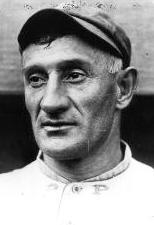Honus

"He was a gentle, kind man, a storyteller, supportive of rookies, patient with fans, cheerful in hard times, careful of the example that he set for youth, a hard worker, a man who had no enemies and who never forgot his friends. He was the most beloved man in baseball before Ruth." -- Bill James
Baseball legend Honus Wagner, known as the "Flying Dutchman," was born on this day in 1874 in Chartiers, Pennsylvania.
Wagner was the most unlikely-looking of shortstops, even when he began to play professional baseball in the Atlantic League in 1895: he stood 5' 11", weighing 200 pounds; and he was barrel-chested, thick-necked, long-waisted and noticeably bow-legged, with orangutanian arms that enabled him, said Lefty Gomez, to tie his big shoes with his thick hands without bending down.
Yet without question he was one of the great athletes and best all-around ballplayers of his time, and in 21 seasons in the major leagues (3 with the Louisville Colonels, the rest with the Pittsburgh Pirates) he was to dominate National League batting statistics the way Ty Cobb dominated the American League, leading the league in batting 8 times, slugging 6 times and stolen bases 5 times. He was also an exceptional fielder; contemporaries liked to describe his fielding abilities in terms usually reserved for steam-shovels.
By way of contrast to Cobb, however, Wagner was as sunny and likeable a fellow as one could imagine. He was also mindful of his influence on children, and since he did not like the idea of children being lured to smoke cigarettes, he halted the use of his picture on cards sold by the American Tobacco Co. in 1910, with the result that only about 20 American Tobacco Honus Wagner cards were known to exist in the 1990s, making it among the rarest of old baseball cards. In 1991, the now-beleaguered hockey star Wayne Gretzky purchased one of these Wagner cards at auction for $451,000.
When Wagner retired in 1917 (with a lifetime batting average of .327), he had amassed more hits, runs, total bases, runs batted in and stolen bases than any player up to that time.
He later served as a coach for the Pirates -- some say more as a mascot -- and lent his name to a Pittsburgh sporting goods store which still thrives today, his garrulous caricature appearing on the storefront. A developer was recently rebuffed by the Carnegie, Pennsylvania zoning hearing board in its attempts to turn Wagner's old home there into a bed-and-breakfast in time for the All-Star Game, which this year will be played in Pittsburgh's PNC Park. To these "memorials" one must also add the heroic larger-than-life statue of him by Frank Vittor that stands outside PNC Park, a reminder to today's fans that giants used to walk the Earth.
Wagner was inducted into the Baseball Hall of Fame with the elite inaugural class in 1936. He died on December 6, 1955 in Carnegie.
Categories: Baseball, PNC-Park, Pittsburghiana
Labels: Baseball, Pittsburgh History, Pittsburghiana





1 Comments:
I love that statue and to find that he was a realy nice guy is great. Some one should make a movie about him.
Post a Comment
Subscribe to Post Comments [Atom]
<< Home